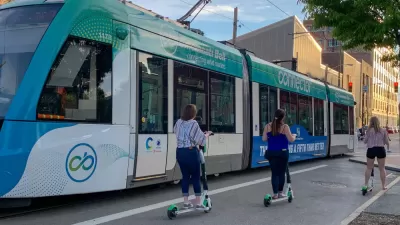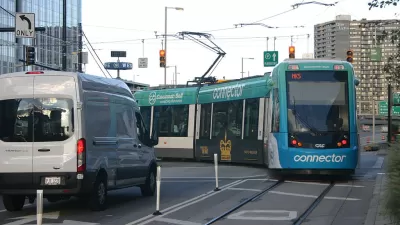After narrowly escaping attempts to kill the project, the Cincinnati Streetcar is now faced with questions about how to fund and expand the system.
According to Sharon Coolridge, "Cincinnati City Council on Wednesday asked the city's administration to study expanding the streetcar to Uptown."
"The study will look at where future funding could come from and is not expected to cost taxpayers additional money, beyond city staff time," adds Coolridge.
The study moved forward on a 5-4 vote and despite a "lengthy argument" and notable opposition from Cincinnati Mayor John Cranley. Mayor Cranley called the decision to study the second phase irresponsible. Coolridge quotes the mayor directly asking a rhetorical question to explain his opposition: "Shouldn't the focus be on making the first phase a success?"
For those keeping track at home, Coolridge explains how the Uptown extension, as proposed for Phase II of the streetcar project, was a part of the original plan for the system until Ohio Governor John Kasich pulled all $52 million in state funding for the project in 2011. Local officials moved forward with Phase I, which runs through Downtown and Over-the-Rhine. Funding also figures into the projects recent controversies, and Mayor Cranley's concerns, because the city has yet to resolve a $600,000 deficit for operating Phase I of the system.
Coolridge also notes that the Uptown extension has already been studied: "In 2009, consultants completed a feasibility study on the Uptown route, and streetcar project leaders spent another $201,000 on two Uptown studies last year."
FULL STORY: Council OKs Uptown streetcar study

Alabama: Trump Terminates Settlements for Black Communities Harmed By Raw Sewage
Trump deemed the landmark civil rights agreement “illegal DEI and environmental justice policy.”

Planetizen Federal Action Tracker
A weekly monitor of how Trump’s orders and actions are impacting planners and planning in America.

Why Should We Subsidize Public Transportation?
Many public transit agencies face financial stress due to rising costs, declining fare revenue, and declining subsidies. Transit advocates must provide a strong business case for increasing public transit funding.

Understanding Road Diets
An explainer from Momentum highlights the advantages of reducing vehicle lanes in favor of more bike, transit, and pedestrian infrastructure.

New California Law Regulates Warehouse Pollution
A new law tightens building and emissions regulations for large distribution warehouses to mitigate air pollution and traffic in surrounding communities.

Phoenix Announces Opening Date for Light Rail Extension
The South Central extension will connect South Phoenix to downtown and other major hubs starting on June 7.
Urban Design for Planners 1: Software Tools
This six-course series explores essential urban design concepts using open source software and equips planners with the tools they need to participate fully in the urban design process.
Planning for Universal Design
Learn the tools for implementing Universal Design in planning regulations.
Caltrans
Smith Gee Studio
Institute for Housing and Urban Development Studies (IHS)
City of Grandview
Harvard GSD Executive Education
Toledo-Lucas County Plan Commissions
Salt Lake City
NYU Wagner Graduate School of Public Service




























